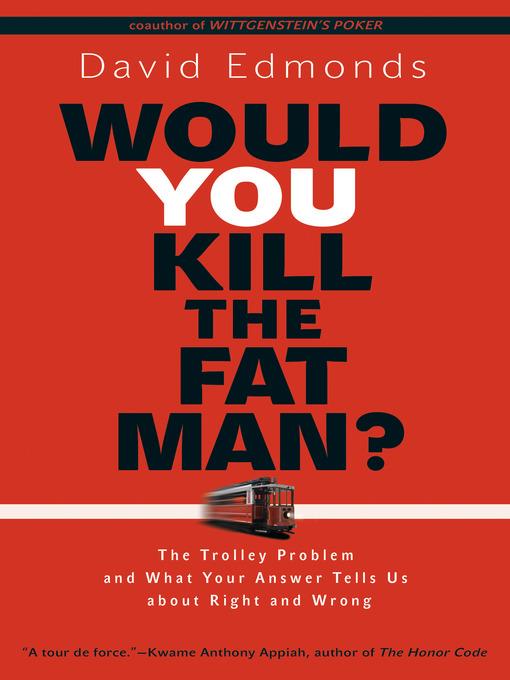
Would You Kill the Fat Man?
The Trolley Problem and What Your Answer Tells Us about Right and Wrong
کتاب های مرتبط
- اطلاعات
- نقد و بررسی
- دیدگاه کاربران
نقد و بررسی

September 23, 2013
Edmonds (coauthor of Wittgenstein’s Poker), a senior research associate at Oxford’s Uehiro Centre for Practical Ethics, offers an accessible, humorous examination of how people approach complex ethical dilemmas. The “trolley problem,” originally designed by philosopher Philippa Foot, is a scenario in which, to save five people from an oncoming trolley, one must sacrifice another person. In the majority of these philosophical puzzles, the titular fat man must die at your hands (by being pushed off the bridge) to save several lives. This experiment tests people’s ethical decision making and interpretations of the results generally fall into two broad camps. Utilitarianism, conceived by Jeremy Bentham and John Stuart Mill, suggests that choices should be made based on how much pleasure they produce and pain they avoid. For that reason, “it was always better to save more than fewer lives,” Edmonds notes. The other, deontology, made famous by Immanuel Kant, argues that people should never use others as a “means to an end.” Most people, according to Edmonds, are deontologists; they find it difficult to kill another human being even if it would save five. Here, Edmonds includes similar real-world situations, such as the 1894 Pullman strike, and a “ticking clock” German kidnapping case. Written for general readers, the book captures the complexities underpinning difficult decisions.

September 15, 2013
An investigation into how we make moral decisions. A trolley is hurtling down a track on which five people are tied to the rails. You are standing on a footbridge beside a fat man, a stranger to you. If you push him onto the tracks, he'll stop the trolley. Of course, he would die; but you would have saved five people. Do you kill the fat man? This thought problem, invented by philosopher Philippa Foot, is central to Edmonds' (co-author: Philosophy Bites Back, 2013, etc.) sprightly history of moral philosophy. The author is a master at distilling the work of some difficult writers, most importantly Immanuel Kant and Jeremy Bentham, whose opposing views are still being debated. Kant believed in certain moral absolutes--murder is wrong, for example--that should never be breached. Bentham, the father of utilitarianism, believed that moral actions are those that cause the greatest good, ensuring pleasure and well-being to the most people. Presenting contemporary perspectives, Edmonds turns to philosophers such as John Rawls, Bernard Williams, and utilitarian Peter Singer; behavioral economists, such as Daniel Kahneman; psychologists, such as Jonathan Haidt and Joshua Greene; and neuroscientists, such as Antonio Damasio. How, these thinkers ask, do we distinguish "between negative and positive duties, between doing and allowing (killing and letting die), and between acting and omitting?" Moral decisions raise big questions: Do we, for example, have free will? Are we more charitable if we have just had a positive experience, such as a delicious lunch? Are we programmed genetically to act morally? Are we guided as much, or more, by intuition--a gut feeling--as by rational thinking? And finally, "do philosophers have any special authority over--any unique insight into--what's right and what's wrong?" As Edmonds amply and lucidly shows in this cogent book, moral questions have no easy answers.
COPYRIGHT(2013) Kirkus Reviews, ALL RIGHTS RESERVED.

October 15, 2013
Suppose we can save several lives by diverting a runaway trolley with five people in its path so it kills only one man (the fat man), or suppose that six men can survive in a lifeboat by eating a seventh. Most people, according to Edmonds's (senior research associate, Oxford's Uehiro Ctr. for Practical Ethics; BBC World Service; coauthor, Wittgenstein's Poker: The Story of a Ten-Minute Argument Between Two Great Philosophers) reports/surveys, "save as many lives as possible." But if we can only stop the trolley by throwing a nearby fat man off a bridge, many people say "no." ("Fat Man" was the name of the atomic bomb dropped on Nagasaki "to save lives.") The book explains that in some cases "intentions" matter; our primary intention is not to kill the man on whom we turn the trolley, but the fat man is different, as are the lifeboat cannibals. Edmonds traces these puzzles through the work of British philosophers Philippa Foot (1920-2010), Elizabeth Anscombe (1919-2001), and others, in a witty and thought-provoking tale. The author wouldn't kill the fat man, but he doesn't offer further remarks. While there are no solid answers, real-life cases have led us to prevention through social planning--safer trolley lines and better search and rescue. VERDICT A good read, necessarily ending in numbing thoughts.--Leslie Armour, Dominican Univ. Coll., Ottawa
Copyright 2013 Library Journal, LLC Used with permission.

























دیدگاه کاربران